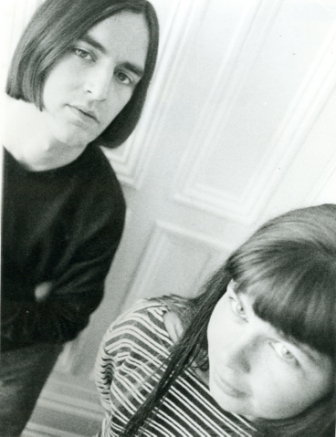“I drew animals all the time, and would spend a lot of time going to zoos and aquariums when I was little,” says Brian DeGraw of Gang Gang Dance. “I just think about animals a lot. I could spend all night tripping out on nature documentaries. I don’t find humans to be terribly interesting. I’m more interested in blurring the line between animal and human.”
The trance-inducing blasts of tribal insanity created by the New York–based art-rock ensemble certainly exist somewhere between the two. With this in mind, it’s only natural that their new, two-disc CD/DVD, Retina Riddim, conceived by DeGraw, often blurs the line between animal and human. Much like a nature video, seldom is there actual dialogue on film—just a series of circumventing audio snippets synchronized to the footage (live performances, cityscapes, and nature scenes, shot in different parts of the world by various band members). Within that are split-second frame splices and looped sequences, many of which are still shots and video recordings of gorillas, the fundamental spirit animal of Retina Riddim—an animal that also happens to grace the cover and inner sleeve.
“I got really involved watching all these films on Koko, the sign-language-speaking gorilla,” DeGraw says. “It’s fascinating how close gorillas are to humans.”
True. Evolutionists, scientists—they have all been saying that for years. But Gang Gang Dance (which consists of DeGraw, drummer Tim Dewit, singer-percussionist Lizzie Bougatsos, and guitarist Josh Diamond) take it to heart. Watching the band perform, it’s easy to imagine them as percussion-happy primates, banging away on their instruments like the apes at the beginning of 2001: A Space Odyssey.
Likewise, their music steps into another dimension, another space, another time. As a dread-headed black man describes in the film, Gang Gang Dance create “intergalactic music for the people’s third eye.”
But blurring the line between animal and human, or physical and metaphysical, isn’t the only thing Retina Riddim succeeds at. DeGraw manages to saturate the senses with a beautiful mess of spiraling and bubbling kaleidoscope imagery and non sequitur frames. While the sounds on the DVD (various loops and reconstructions of found sounds and previous Gang Gang Dance recordings) are in sync with the chopped-up footage, the 24-minute-long companion CD (created after the DVD) acts as its own unique counterpart. It is essentially an audio collage of seesawing violins, pulped beats, and cascading soundscapes that allows ample room for listeners to conjure their own images without the aid of the DVD.
The natural evolution of Gang Gang Dance has taken many shapes and forms since the group formed in the first years of the new millennium. In the beginning, it was a five-piece that relied heavily on improvisation with more straightforward instruments—bass, drums, guitar, banjo—until it got to a point where the band members “just [got] bored with the sound,” says DeGraw. “It just felt way too limited.”
Following the tragic death of bandmate Nathan Maddox, who was struck by lightning in 2002, Gang Gang Dance slowly began working electronics into the mix, including keyboards and drum machines, which would later surface on their 2005 full-length, God’s Money, an album rich with precarious noises, keyboards, and hypnotic, percussive rhythms, not to mention Bourgatsos’ phantomlike vocals.
“We’re still by no means the most technological,” says DeGraw. “Our gear is all pretty outdated. My main keyboard is some Yamaha piece of shit from the ’80s—the kind that’s intended for learning on. But through effects, it makes [the gear] sound more original.”
Even though their gear is not the most technologically advanced, it’s what comes out of it that matters. In many respects, Gang Gang Dance dare to challenge the mind with innovative ideas and abstract solutions, consistently breaking through musical boundaries, and refusing to subject themselves to one defined sound.
“None of us want to make guitar-rock music,” says DeGraw. “We like ripping everything apart and working with the little bits. None of us really think about it. It just happens.”
Like instinct.






